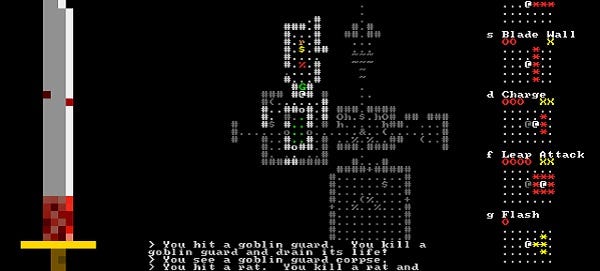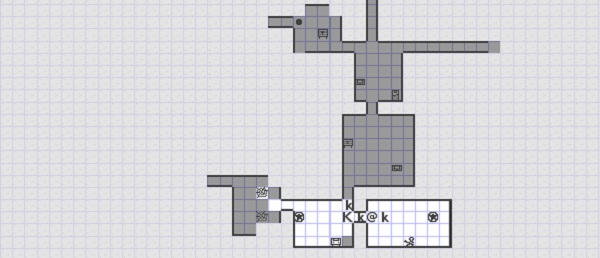The Many Faces Of Roguelikes: Seven Days Of Rogue
That w@s the week that w@s
Preamble alert! The 7-day Roguelike Challenge is not new but this year it has drawn a record number of entries. More than seventy roguelikes were created, by individuals or teams, in the seven days allotted. Back in 2008, when the excellent Fatherhood was an entry, there were only nine successful submissions. I deeply regret that I don't have time to play seventy roguelikes but that is the truth of it, so I am grateful to Andrew Doull of the stirring Roguelike Radio for providing me with a shortlist. It didn't stop me playing a few others but it's always good to know where to start.
Sword in Hand
War! That's a bit different already. Usually it's a case of preventing war by finding the artifact that might begin the war, or that might skip the war and cut straight to the millions of dead. At least that's my understanding, although my grasp of the actual plots is often lacking. There's got to be a reason all those amulets and orbs are so important though and I choose to think of my kobold tourist as a sort of Hans Blix with a +8 mace of smiting, seeking the WMDs in whatever dark corner they're hidden in and clobbering anyone who stands in the way.
Sword in Hand takes place during a war though, one which you can influence even though you're a sword rather than a person. I probably should have mentioned that already actually. You're a sword, not just any sword but the most effective slicer and dicer in the world. You are The Freyblade and, as the game itself points out, "you do deserve the definite article".
I'm not going to say too much more because discovering how much is possible is part of the fun. There is plenty to see though, nifty use of blood and some clever reworkings of the familiar. It's also worth pointing out that this was made by the dashing Jeff Lait who also made Fatherhood back in the ancient time of 2008, when roguelikes were considered to be at the cutting edge of computer visuals.
Fuel
Fuel is a bit different too. For starters, it's sci-fi. Whenever I stumble across a sci-fi roguelike I'm reminded of Alphaman, which was probably the first non-fantasy effort I played and I absolutely loved it. Even though so much of what was involved was probably renaming, so that abilities were mutations and magic items were unidentified tech, it felt incredibly fresh. Actually, I take that back, it wasn't just renaming, there was plenty to like about Alphaman. It had a better grasp of theme than most of what I play and even if I didn't fully enjoy some of the sillier moments, I look back on it fondly.
Fuel is a different kettle of petrol though, being a sidescrolling affair. Say sidescrolling and roguelike in close proximity and I tend to think spelunky but this isn't Spelunky. It's Fuel. The major difference is that it's turn-based, with everything moving along with the player, even falling rock formations.
A stranded space miner who must discover the necessaries to repair his/her ship, the main character has an anti-gravity belt and a blaster. Exploring randomly generated caves to find power for your devices as well as the monopoles that will allow escape, it's a game that becomes a case of conserving power, only using the anti-grav and blaster when necessary. I struggled to make progress but you may think it's the best thing since carefully partitioned bread.
Fictional Roguelike
Although there's a lot less game here than in the previous two downloads, Fictional Roguelike fills me with glee. I harp on and on about the fact that roguelikes are one of the most efficient storytelling engines around, packed with narratives that are waiting for any chance to emerge from the shadows, pouncing, bristling with subplots. Tritax has recognised that and therefore adds layers of flavour text to a stripped back, standard roguelike structure.
It's incredibly basic, with monsters (not of various types), bosses and controls that allow movement, combat and little else. But it's onto something. Walking through these maps, which look like the ones I used to doodle on the graph paper in science classes as a kid, there's a sense that stories are waiting in the wings. The simple act of giving names to rooms helps and it's a project I'd like to see taken further.
There are fleshed out roguelikes doing similar things, most notably, in my experience, Incursion and Brogue, both of which have dungeons with a little more life and local colour. However, a roguelike built around the creation of a flexible narrative vocabulary and grammar is something I could become very excited about.
I Rule, You Rule, We All Rule Old-School Hryule
I was talking to a gathering of games folk the other week and they were shocked to discover that I've never finished a Zelda game. I actually undermined my own argument because I was suggesting that once you've finished one you've finished them all. How would I know that? Guesswork.
I rule, you rule, we all rule old-school Hyrule may well be the first Zelda game I do finish because it's a roguelike, see, and that's where I'm comfortable. Not that I ever finish roguelikes either because they are generally hard and I am, as a rule, extremely soft.
What's different about this one then, the Hyrule theme aside? Well, it's a competitive roguelike, with heroes scattered around the land all aiming to gain enough fame to become rulers. They do this by discovering stuff, killing particularly tough monsters and doing all the other things that are expected of adventuresome sorts. Reports flash up telling you what your rivals are up to and when you find out Link, of all people, has discovered some mystical MacGuffin, it's hard not to throw up your hands in despair. Of course he has. Why wouldn't he, the little do-gooder.
Then I realised I can find him and murder him, so that's good.
It's yet another twist on the formula and this one's aided by map generation that looks like an old-fashioned top-down Zelda world, separated into distinct areas that often have paths running through them rather than large open spaces. Excellent.
">GatewayRL
Finally, I couldn't ignore GatewayRL because it's as close to a S.T.A.L.K.E.R. roguelike as anything I've ever played. Far too complex for me to make a dent in during the short time I've been playing, it dumps the player and a group of companions in a hub that contains a bar and shuttles to a zone full of anomalies to be procured. Sometimes crew members will refuse to join a mission, presumably because missions involve having their brains assaulted by gases and their bodies broken into pieces by horrible incidents.
Again, it could be the start of something fantastic and I hope development continues. The inspiration, Roadside Picnic aside, is Frederik Pohl's Gateway, which I haven't read. Now I want to.
Read about many more entries, including the noble failures, in the event blog. If you find anything fascinating pop it in a comment below. Also, for more, the Roguelike Radio team have episodes on the event, past and present, here. They're always worth a listen. A judging committee of braver men than me will be looking at every entry; I'll look at their findings as well once they're available.













